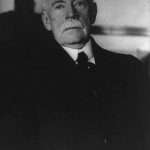The brains to speak
In 1899, as the Nineteenth Century, a time of revolutionary change, drew to a close, Charles Duell, head of the United States’ patent office, is alleged to have suggested that his office was redundant and should be abolished; Duell is claimed to have declared, ‘everything that can be discovered, has been discovered’.
In fact, Duell’s thinking was very different; he anticipated much greater things in the years to come. It would have demanded an extraordinary degree of prescience for anyone in 1899 to have anticipated all of the the discoveries of Twentieth Century, but Duell was optimistic about change, in 1902 he declared:
In my opinion, all previous advances in the various lines of invention will appear totally insignificant when compared with those which the present century will witness. I almost wish that I might live my life over again to see the wonders which are at the threshold.
Had Duell been born a hundred years later, it is difficult to know what discoveries he might have thought possible in the Twenty-First Century
Applying the parlance of Donald Rumsfeld to to field of science and technology, there are known unknowns: unknowns such as the discovery of the Higgs Boson and the definition of dark matter; the question of whether neutrinos can really travel faster than light; the mystery of what other planets might be like our own and what life might be on them. But there are the unknown unknowns, the serendipitous breakthroughs, the discoveries that owe more to chance than design, and the possibilities that might emerge if as yet impossible technologies became possible.
Were I to be granted a wish for a serendipitous breakthrough it would be for a dream machine – it would be for a neuro-Google; a device no bigger than a bluetooth earpiece that can pick up the electronic pulses generated by thoughts and translate those pulses into a language with which to search the Internet and find answers.
It would be able to find for me a piece of music that has about it a silkiness and an Arabian feeling, the name or composer of which is unknown. Try typing the terms into a search engine and it leads nowhere; neuro-Google would be able to take the tune from inside the head and find it out there, wherever it is.
Neuro-Google would not only act as a receiver from the brain, it would be able to transmit signals back. Those moments when one is lost for words, or when one says the wrong thing, would become a thing of the past. It would act as a dictionary and thesaurus, enabling one to articulate one’s sentiments with charm and style. It might even fulfil the role of the Babel fish from Hitchhiker’s Guide to the Galaxy providing simultaneous translation of speech heard and enabling one to speak in whatever language was necessary.
The only disadvantage of such a technology would be the loss of the pop music industry as songs about angst, misunderstanding and broken relationships became obsolete in a world where people said the right things, and happiness became so common that it would hardly be worth a song.



Invention and development is totally beyond imagination. When I was at school many years ago a comic called The Eagle appeared on the scene, they had communicators all totally science fiction, what do we have now smart phones and more, what will be next.
We’re in the realm of science fiction. I look forward to one of those transporters with which Scottie used to beam up Captain Kirk!